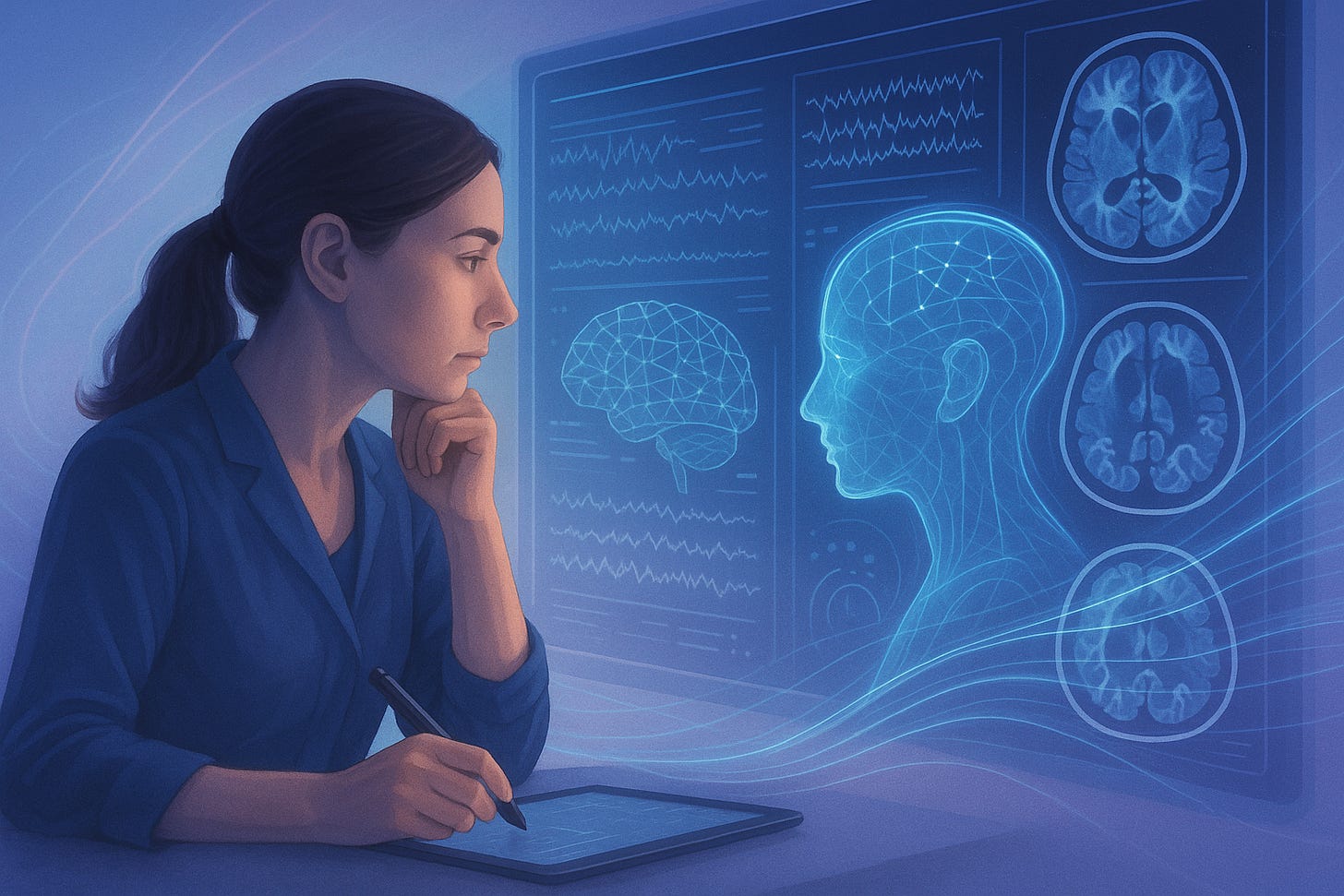The Mind's Silent Whispers: How AI Is Decoding Mental Health Like Never Before
Artificial Intelligence Is Uncovering the Hidden Signs of Mental Health Struggles
The pause before answering. The playlist that shifts overnight. The way someone types “I’m fine.” These tiny behaviors once passed unnoticed. Until a couple of decades ago, the diagnosis of mental disorders was based on subjective evaluation, self-report questionnaires, behavioral observations, and clinician Instincts. But what if machines were able to detect the invisible patterns that humans are not able to see?
Artificial intelligence is also slowly transforming the way we identify disorders, such as depression, schizophrenia, and dementia, at the cutting edge of psychiatry. Recent studies show artificial intelligence is not merely a helpful tool used by mental health professionals; it is far more accurate than conventional approaches, detecting early warning signs with an impressive degree of precision.
The Brain’s Digital Translator Mental health disorders are notoriously complex. Symptoms often overlap, and biological markers are hidden beneath layers of noise. Traditional diagnosis? It is slow, inaccurate in many cases, and it leaves too many blanks. Machine learning models identify those small indicators that the human eye cannot see through analyzing speech patterns, brain waves, text, and medical images. Think of it as a digital stethoscope for the mind:
Social media posts reveal linguistic red flags for depression.
EEG brain signals expose schizophrenia’s electrical fingerprints.
MRI scans uncover dementia’s structural shadows.
The stakes are as high as it can get. Bipolar disorder or suicidality can be prevented by early diagnosis, but today, some misdiagnosis rates fly over the 30% mark. AI is promised to offer faster, sharper lens.
Startling Numbers, Real Hope In an enormous new study, researchers tested AI on the five leading mental health conditions. The outcome? A sight of the future of psychiatry.
Anxiety & depression prediction in gamers hit 96% accuracy using patterns in gameplay behavior.
Autism spectrum disorder was identified at 98% accuracy, rivaling expert clinicians.
Schizophrenia, spotted in EEG brain waves, reached 83% accuracy with AI time-series analysis.
Text-based suicidality detection soared to 93%, reading between the lines of language.
Dementia diagnosis neared perfection: 99% accuracy from MRI scans.
The two sophisticated methods at the center of this change have been possible:
LightGBM and XGBoost: tree-based algorithms that devour survey data, spotting risk factors like digital bloodhounds.
LSTM and GRU networks: deep learning models that decode time-based patterns in brain signals or text, mimicking how neurologists trace cause-and-effect.
More importantly, they are not lab novelties. There is at least one model that signaled suicidal intention in social media posts months before crisis events that demonstrated AI can purchase valuable time to intervene.
Why Your Doctor Might Soon Work with Algorithms This isn’t about replacing humans. It’s about arming them. AI’s real superpower is Scale and speed. While a psychiatrist might see 20 patients daily, algorithms screen thousands of EEGs, MRIs, or online interactions in minutes. They catch what fatigued eyes miss:
"Theta wave dips in the prefrontal cortex during focus tests? That’s schizophrenia marker human EEG readers often overlook."
The research provides a useful reminder, though: AI is not a solution. Narrow models, such as most models in medical AI, risk enforcing biases in the data. And no algorithm today can recognize context as well as a human clinician.
"A tweet saying ‘I can’t do this anymore’ might signal depression or just a bad day. AI needs human wisdom to tell the difference."
The Road Ahead: Precision Psychiatry Imagine a world where:
Phones detect anxiety spikes from typing patterns, prompting breathing exercises.
VR games flag autism traits in Children during play.
Elderly wearables predict dementia years before memory lapses.
We’re closer than you think. Next-gen AI could personalize treatments, matching drugs to your brain chemistry or tailoring therapy to your speech rhythms. Yet challenges linger. Training AI on diverse global data is essential. And doctors need interpretable tools, not "black boxes" that spit out diagnoses without explanation.
As one researcher put it, "AI won’t replace clinicians. But clinicians using AI will replace those who don’t."
The Bottom Line
Algorithms will not unlock the entire secret of the human mind; however, they are becoming important tools, discovering patterns too complex or too obscure to be noticed by humans. To the millions of people waiting to get answers, that is not merely technology, but hope.
It’s hope, coded in 1s and 0s.





Hey! Your post caught my eye on my homepage and I just wanted to send some support your way. Whenever you have a moment I’d be grateful if you could check out my latest newsletter. I’m always happy to support and lift each other up!